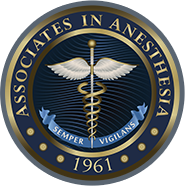Patient Resources
We’ve compiled some of the most frequently asked questions we receive. If you have additional questions, please contact our team or your physician before your procedure.
If you need financial assistance, visit United Credit.

WHAT IS ANESTHESIA?
Anesthesia involves the administration of medication to allow medical procedures to be done without pain or discomfort. Anesthesia can be administered through different techniques, depending on a patient’s needs. It is important to understand the types of anesthesia, and what to expect from your anesthesia experience, to ensure your comfort and safety.
On the days leading up to your surgery and the day of your surgery, your anesthesiologist will be there at all times to keep you informed of the procedure and effects of anesthesia.
WHAT TYPES OF ANESTHESIA
CAN BE USED DURING MY OPERATION?
Monitored Anesthesia Care:
Monitored anesthesia care (MAC) is often described as intravenous sedation. It is an anesthesia service in which an anesthesiologist or CRNA continually monitors and supports the patient’s vital functions and diagnoses and treats issues that may arise. Intravenous medications may be given at varying levels depending on the procedure and the patient’s condition. Your safety and comfort are of utmost importance. Occasionally MAC may need to be converted to general anesthesia.
General Anesthesia:
With general anesthesia, the patient is unconscious or “asleep” for the duration of the surgery. General anesthesia is most commonly administered through a combination of intravenous drugs and inhaled gases (anesthetics). The patient is being continuously monitored throughout the procedure.
Regional Anesthesia:
Regional anesthesia involves rendering only a portion of a patient’s body numb or insensitive to a surgical procedure. It can be used alone or in conjunction with general anesthesia to make a body area numb and provide hours of post-operative pain relief. Common examples of employing a regional anesthetic include shoulder and upper extremity surgery. Cesarean section, hip, knee, vascular, foot, and prostate surgeries have all been successfully performed with regional techniques. Relief of labor pain during childbirth is commonly achieved with epidural anesthesia.
FAQs
-
WHAT TO EXPECT FROM YOUR ANESTHESIA EXPERIENCE?
Your experience will include the pre-op portion, the procedure, and recovery.
Depending on which facility your procedure is scheduled, you may review your medical history by phone, internet portal or a visit to our preop testing center (PPEC). This may include blood work, EKG, X-rays, or a consult to your doctor when needed. Regardless, you will meet your anesthesiologist the day of your procedure to address all of your questions.
Every AIA team member will make your comfort and safety our top priority.
-
WILL MY PROCEDURE BE AN INPATIENT OR OUTPATIENT SURGERY?
Depending on your operation’s complexity and necessary recovery time, your doctor will also determine whether your procedure requires inpatient or outpatient surgery. If you are scheduled to have outpatient surgery, you will not be hospitalized overnight and can return home for recovery. You should also have a family member or friend available to drive you home.
Regardless of whether you have inpatient or outpatient surgery, you will be moved to a recovery room immediately after your surgery for continued monitoring and discharged once your doctors have cleared you.
-
HOW LONG WILL I NEED TO RECOVER FROM GENERAL ANESTHESIA?
The post-surgical effects of the procedure will vary with each patient. Most people wake up in the recovery room shortly after the operation and can be groggy while medicines leave their system.
You will also need to arrange for a friend or family member to pick you up once you’re released. We advise against making important decisions or operating a vehicle for 24 hours after your surgery.
-
WHY CAN’T I EAT OR DRINK BEFORE AN OPERATION?
The patient’s stomach needs to be empty to prevent serious health issues during the procedure. Check with your surgeon before your appointment. Generally, it is recommended that the patient have no solid food 8 hours before the procedure. Patients can usually have CLEAR LIQUIDS up until 3 hours prior to arrival. This should be limited to water, sports drinks and black coffee. No milk, fat or protein is permitted as they digest more slowly.
-
HOW WILL MY DOCTOR FIND OUT ABOUT MY RISK OF PROBLEMS FROM ANESTHESIA?
Before your surgery, you will have a pre-anesthesia visit with your anesthesiologist. This visit is an important step in your surgery. Your anesthesia care team will interview you for information on:
- Your general health
- Any known allergies
- Any chronic or other medical conditions
- Recent hospital visits or past surgeries
- Previous experiences with anesthesia
-
SHOULD I CONTINUE TO TAKE MY NORMAL MEDICATIONS BEFORE SURGERY?
Every patient is different. You will receive pre-operative instructions from your facility or physician.
-
WHO WILL BE IN THE ROOM WHILE MY OPERATION TAKES PLACE?
Along with the qualified medical team performing your surgery, your anesthesiologist (an M.D. or D.O.) and possibly a nurse anesthetist (CRNA) will be with you throughout the operation. Your anesthesia team will monitor you during the entire procedure and see you safely into the Post-Anesthesia Care Unit.
-
HOW AM I BILLED FOR THE ANESTHESIOLOGIST’S SERVICES?
In most cases, you will receive a bill for anesthesia professional services administered during your surgery from the anesthesiologist. Your bill from the hospital or facility may include charges for technology, supplies and equipment used on your behalf. This is not from AIA, Inc. You are also responsible for any deductibles or co-pays, depending on your insurance.
-
MY BILL HAS TWO SEPARATE CHARGES FOR SERVICES PERFORMED BY THE ANESTHESIOLOGIST AND THE NURSE ANESTHETIST. WHY AM I BEING CHARGED TWICE?
Some insurance providers require separate charges to be submitted for both the Anesthesiologist’s services and the Nurse Anesthetist’s (CRNA) services. The total amount is equal to what would be charged if a single anesthesia provider existed.
Depending on your insurance policy and coverage, it may be necessary for separate charges to be filed for each anesthesia provider to receive full reimbursement.
-
DOES ASSOCIATES IN ANESTHESIA PARTICIPATE WITH MY HEALTH INSURANCE PLAN? WHAT FORMS OF PAYMENT DO YOU ACCEPT?
Associates in Anesthesia, Inc. participates with Medicare, Medicaid, and most commercial and state-funded HMOs. If you have any questions regarding anesthesia coverage with your specific insurance, please contact our billing department at 610-874-6448.
Have Additional Questions About Your Care?
Our team is always here to assist you with additional questions about your care. If you need financial assistance, visit United Credit.
